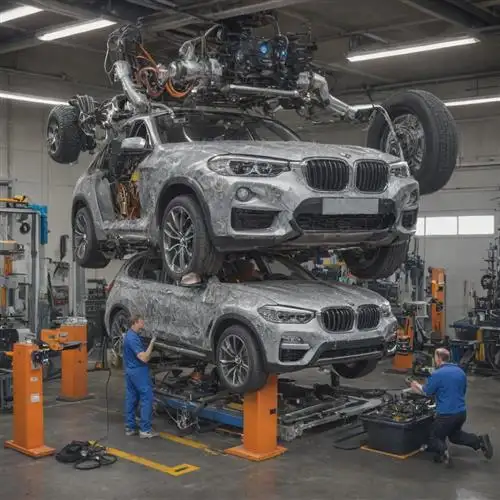
Importance of Regular Maintenance
Maintaining your BMW X3 without breaking the bank starts with understanding the importance of regular maintenance. Proper care and attention can extend the life of your vehicle, enhance its performance, and even improve fuel efficiency. Neglecting maintenance, on the other hand, can lead to costly repairs down the line.
One of the most critical aspects of maintaining your BMW X3 is adhering to the manufacturer's recommended service schedule. This includes regular oil changes, filter replacements, and inspections of key components such as the brakes, suspension, and tires. Failing to follow these guidelines can result in premature wear and tear, ultimately leading to more significant and expensive problems.
In addition to the manufacturer's recommendations, it's essential to be proactive in identifying and addressing any issues that may arise. This can be achieved through regular visual inspections, attentive driving, and monitoring of warning lights or indicators on the dashboard. By addressing problems early, you can often avoid more costly repairs and maintain the overall health of your BMW X3.
Another important factor in cost-effective maintenance is choosing the right parts and service providers. While it may be tempting to opt for cheaper, aftermarket parts, it's crucial to ensure that they meet the same quality standards as the original equipment manufacturer (OEM) parts. Using inferior parts can lead to further issues and potentially void your vehicle's warranty.
When it comes to servicing your BMW X3, it's often worth considering an authorized BMW service center or a reputable independent mechanic who specializes in German luxury vehicles. These professionals have the expertise and equipment necessary to properly maintain your vehicle, often at a lower cost than the dealership.
DIY Maintenance Tasks for the BMW X3
As a proud owner of a BMW X3, maintaining your vehicle without breaking the bank is a top priority. One of the key aspects of keeping your X3 in tip-top shape is performing routine DIY maintenance tasks. These tasks not only save you money but also allow you to develop a deeper understanding of your vehicle's inner workings.
One of the most critical DIY maintenance tasks for the BMW X3 is regular oil changes. While it may be tempting to rely on professional mechanics, changing your own oil is a straightforward process that can save you a significant amount of money over time. By investing in the right tools and following the manufacturer's guidelines, you can ensure your X3 receives the proper oil and filter changes at the recommended intervals.
Another important DIY task is brake pad and rotor inspection and replacement. The BMW X3 is known for its impressive braking performance, but over time, these components can wear down. By regularly inspecting your brakes and replacing them as needed, you can not only maintain optimal braking power but also avoid costly repairs down the line.
Tire rotation and balancing is another essential DIY maintenance task for the BMW X3. This simple procedure helps to ensure even tire wear, which can prolong the life of your tires and improve the overall ride quality of your vehicle. By rotating your tires at the recommended intervals, you can save money on tire replacements and maintain a smooth, comfortable driving experience.
One of the more complex DIY tasks for the BMW X3 is engine air filter replacement. While this may seem daunting, it's a relatively straightforward process that can significantly improve your vehicle's performance and fuel efficiency. By replacing the air filter at the recommended intervals, you can ensure your engine is receiving the clean, unobstructed airflow it needs to operate at its best.
Finding Reliable and Affordable BMW X3 Parts
Maintaining your BMW X3 can be a daunting task, especially when it comes to sourcing reliable and affordable parts. However, with the right approach, you can keep your vehicle running smoothly without breaking the bank. One of the keys to finding reliable and affordable BMW X3 parts is to understand the various options available to you.
Firstly, consider purchasing genuine BMW parts. While these may be more expensive than aftermarket options, they are designed specifically for your vehicle and are often backed by a manufacturer's warranty. This can provide peace of mind and ensure that your BMW X3 continues to perform at its best. Additionally, many BMW dealerships and authorized service centers offer regular promotions and discounts on genuine parts, so it's worth keeping an eye out for these opportunities.
If genuine BMW parts are not within your budget, there are several alternative options to consider. Aftermarket parts, sourced from reputable third-party suppliers, can offer significant cost savings while still maintaining a high level of quality. When selecting aftermarket parts, be sure to research the manufacturer's reputation, read customer reviews, and ensure that the parts are compatible with your specific BMW X3 model and year.
Another option to explore is the used parts market. Salvage yards and online marketplaces can be excellent sources for finding high-quality, pre-owned BMW X3 parts at a fraction of the cost of new components. However, it's crucial to carefully inspect any used parts before purchasing to ensure they are in good condition and will perform as expected.
When sourcing parts, whether new, aftermarket, or used, it's also important to consider the availability and delivery times. Some parts may be more readily available than others, and the time it takes to receive the parts can impact your vehicle's downtime. Be sure to factor in these considerations when budgeting and planning for your BMW X3 maintenance and repairs.
Tips for Extending the Life of Your BMW X3
Maintaining your BMW X3 is crucial to ensuring its longevity and performance. While the X3 is a reliable and well-engineered vehicle, proper care and attention are necessary to keep it running at its best. Here are some valuable tips to help you extend the life of your BMW X3 without breaking the bank.
Adhere to the Maintenance Schedule: BMW has a comprehensive maintenance schedule designed to keep your X3 in optimal condition. Follow this schedule religiously, including oil changes, filter replacements, and other routine service intervals. Neglecting these essential maintenance tasks can lead to accelerated wear and tear on your vehicle.
Use Genuine BMW Parts: When it comes to repairs and replacements, always use genuine BMW parts. While aftermarket parts may be cheaper, they may not meet the same quality standards as the original components, which can compromise the performance and longevity of your X3.
Monitor Fluid Levels: Regularly check and maintain the fluid levels in your BMW X3, including engine oil, transmission fluid, brake fluid, and coolant. Keeping these fluids at the recommended levels helps ensure proper lubrication and cooling, which are crucial for the long-term health of your vehicle.
Inspect Tires and Wheels: Proper tire maintenance is essential for your BMW X3. Regularly check the tire pressure, tread depth, and overall condition. Rotate your tires as recommended to ensure even wear. Additionally, have your wheels aligned and balanced periodically to prevent uneven tire wear and improve fuel efficiency.
Address Issues Promptly: If you notice any unusual noises, vibrations, or warning lights on your BMW X3, address them promptly. Ignoring these issues can lead to more significant and costly problems down the line. Addressing them early on can help prevent further damage and extend the life of your vehicle.
Clean and Protect the Exterior: Regular washing and waxing of your BMW X3's exterior can help protect the paint and bodywork from the elements, reducing the risk of corrosion and other forms of damage. Consider using high-quality car care products specifically designed for BMW vehicles.
Invest in Preventive Maintenance: While it may seem like an added expense, investing in preventive maintenance can save you money in the long run. This includes services like brake pad replacements, battery checks, and fuel system cleanings, which can help identify and address potential issues before they become larger problems.
Maintaining Your BMW X3's Performance and Fuel Efficiency
As a BMW X3 owner, preserving the vehicle's peak performance and fuel economy is crucial. The key lies in adhering to the manufacturer's maintenance recommendations and adopting proactive measures to ensure your X3 runs smoothly. Let's explore the strategies that can help you maintain your X3 without breaking the bank.
Regular Oil Changes: Timely oil changes are the bedrock of engine longevity. Refer to your owner's manual to determine the appropriate oil change intervals for your X3. Using the recommended oil grade and quantity can optimize engine lubrication, reduce wear, and improve fuel efficiency.
Air Filter Replacement: The air filter plays a vital role in keeping contaminants out of the engine, which can compromise performance and fuel economy. Inspect and replace the air filter as per the manufacturer's recommendations or whenever it appears dirty.
Tire Maintenance: Properly inflated tires not only enhance handling and safety but also contribute to improved fuel efficiency. Regularly check the tire pressure, including the spare, and rotate the tires to ensure even wear. Consider investing in high-quality tires designed for your X3's specific needs.
Brake System Inspection: The brake system is integral to your X3's performance and safety. Have the brakes, including the pads and rotors, inspected and serviced according to the recommended maintenance schedule. Addressing any issues promptly can prevent more costly repairs down the line.
Spark Plug Replacement: Worn or faulty spark plugs can lead to misfiring, reduced power, and decreased fuel efficiency. Replace the spark plugs at the intervals specified in your owner's manual to maintain optimal engine performance.
Transmission Fluid Change: The BMW X3 features a high-performance transmission, and changing the fluid at the recommended intervals is essential. This helps preserve the transmission's efficiency and longevity, contributing to overall vehicle performance and fuel economy.
Engine Coolant Flush: The engine coolant system plays a critical role in temperature regulation, which directly impacts engine performance and fuel efficiency. Flushing the coolant as per the manufacturer's recommendations helps ensure the system is functioning correctly.
















